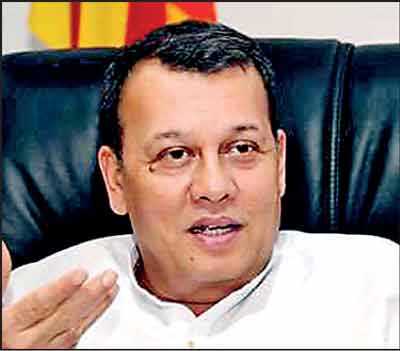Monday Feb 16, 2026
Monday Feb 16, 2026
Wednesday, 27 March 2019 00:00 - - {{hitsCtrl.values.hits}}
By Ashwin Hemmathagama – Our Lobby Correspondent
The United National Party (UNP) Government, led by Prime Minister Ranil Wickremesinghe in 2002, rejecting to sign the Rome Statute, has prevented the international community from taking legal action against Sri Lanka at the International Criminal Court (ICC), a Sri Lanka Freedom Party (SLFP) Parliamentarian said yesterday.
 |
Mahinda Samarasinghe |
According to the Opposition lawmaker Mahinda Samarasinghe, the entire country should be thankful to Ranil Wickremesinghe, who saved the country. Samarasinghe, joining the Committee Stage Program of Budget 2019, charged Illankai Tamil Arasu Kacchi MP M.A. Sumanthiran for threatening to refer Sri Lanka’s case to ICC if international judges are not included in the legal mechanism.
“A political speech Sumanthiran did has destabilised the country. He shouldn’t have made that speech knowing the facts. Sri Lanka is a non-signatory to the Rome Statute. The credit for that must go to Prime Minister Ranil Wickremesinghe. As a result, we are not bound by the Clauses of the Rome Statute,” said Samarasinghe. MP Samarasinghe criticising both present and previous Governments for not following up the promises made at the UNHRC, proposed the Unity Government to get ready for the next UNHRC session in 2022 with reconciliation work, rather waiting till the last moment.
“Sri Lanka received two years after accepting the resolution, which was co-sponsored in 2015. Prior to that, we were taking part in the sessions in 2009 and I was heading the delegation. There was a special session on Sri Lanka, and we were able to win it obtaining almost 2/3 votes. We actively took part in the sessions and made stunning speeches at the assembly but no follow-up action was taken. This led us to fail many votes and finally settled at 12 votes in 2012,” he said.
According to MP Samarasinghe, human rights became a widely spoken topic and the UNHRC was reported in media. “In 2015, the UNHRC was ready with a serious report against Sri Lanka along with economic sanctions, which were in discussion. When we returned to the UNHRC in 2017, we failed to present the details of reconciliation work in Sri Lanka. We have obtained two years by co-sponsoring the resolution. It is better if we could launch a local mechanism rather waiting till 2021,” he added.
“When the President proposed to me to lead a special delegation I explained it is right to send the Minister of Foreign Affairs. The President’s intervention helped us to rectify some areas in the UNHRC report. On 20 March, the Minister of Foreign Affairs addressed the assembly with a statement which was approved by both the President and the Prime Minister. But subsequently, on 25 March, we have accepted the report of the UNHRC based on the instructions. We shouldn’t have taken a hasty decision,” he confirmed.